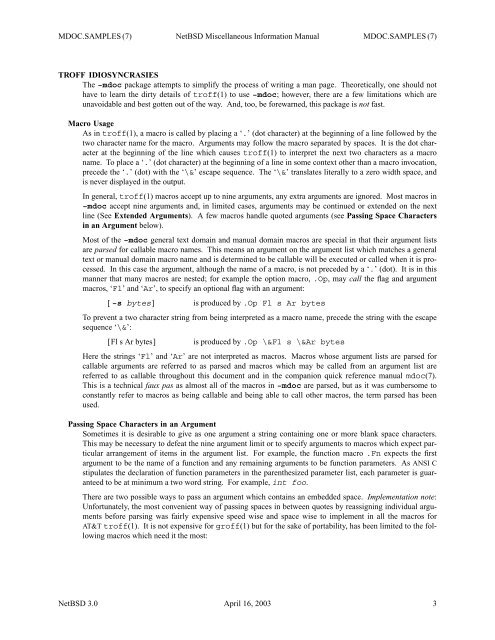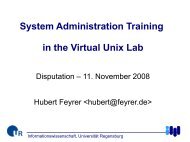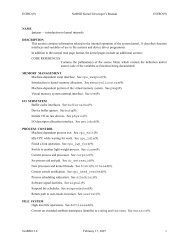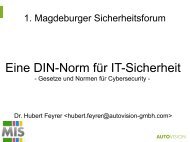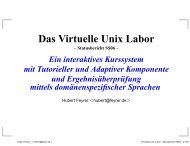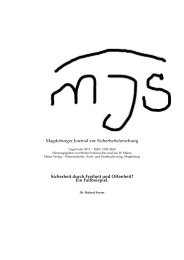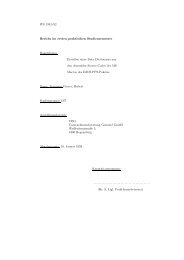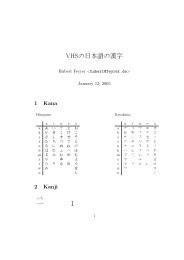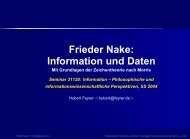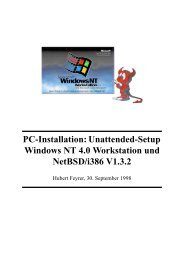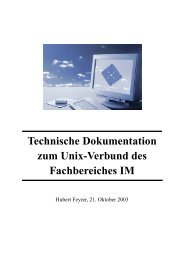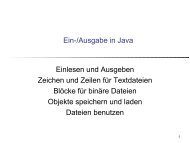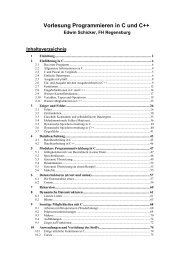INTRO (7) NetBSD Miscellaneous Information Manual INTRO (7 ...
INTRO (7) NetBSD Miscellaneous Information Manual INTRO (7 ...
INTRO (7) NetBSD Miscellaneous Information Manual INTRO (7 ...
Create successful ePaper yourself
Turn your PDF publications into a flip-book with our unique Google optimized e-Paper software.
MDOC.SAMPLES (7) <strong>NetBSD</strong> <strong>Miscellaneous</strong> <strong>Information</strong> <strong>Manual</strong> MDOC.SAMPLES (7)<br />
TROFF IDIOSYNCRASIES<br />
The −mdoc package attempts to simplify the process of writing a man page. Theoretically, one should not<br />
have to learn the dirty details of troff(1) to use −mdoc; however, there are a few limitations which are<br />
unavoidable and best gotten out of the way. And, too, be forewarned, this package is not fast.<br />
Macro Usage<br />
As in troff(1), a macro is called by placing a ‘.’ (dot character) at the beginning of a line followed by the<br />
two character name for the macro. Arguments may follow the macro separated by spaces. It is the dot character<br />
at the beginning of the line which causes troff(1) to interpret the next two characters as a macro<br />
name. To place a ‘.’ (dot character) at the beginning of a line in some context other than a macro invocation,<br />
precede the ‘.’ (dot) with the ‘\&’ escape sequence. The ‘\&’ translates literally to a zero width space, and<br />
is never displayed in the output.<br />
In general, troff(1) macros accept up to nine arguments, any extra arguments are ignored. Most macros in<br />
−mdoc accept nine arguments and, in limited cases, arguments may be continued or extended on the next<br />
line (See Extended Arguments). A few macros handle quoted arguments (see Passing Space Characters<br />
in an Argument below).<br />
Most of the −mdoc general text domain and manual domain macros are special in that their argument lists<br />
are parsed for callable macro names. This means an argument on the argument list which matches a general<br />
text or manual domain macro name and is determined to be callable will be executed or called when it is processed.<br />
In this case the argument, although the name of a macro, is not preceded by a ‘.’ (dot). It is in this<br />
manner that many macros are nested; for example the option macro, .Op, may call the flag and argument<br />
macros, ‘Fl’ and ‘Ar’, to specify an optional flag with an argument:<br />
[ −s bytes] is produced by .Op Fl s Ar bytes<br />
To prevent a two character string from being interpreted as a macro name, precede the string with the escape<br />
sequence ‘\&’:<br />
[FlsArbytes ]<br />
is produced by .Op \&Fl s \&Ar bytes<br />
Here the strings ‘Fl’ and ‘Ar’ are not interpreted as macros. Macros whose argument lists are parsed for<br />
callable arguments are referred to as parsed and macros which may be called from an argument list are<br />
referred to as callable throughout this document and in the companion quick reference manual mdoc(7).<br />
This is a technical faux pas as almost all of the macros in −mdoc are parsed, but as it was cumbersome to<br />
constantly refer to macros as being callable and being able to call other macros, the term parsed has been<br />
used.<br />
Passing Space Characters in an Argument<br />
Sometimes it is desirable to give as one argument a string containing one or more blank space characters.<br />
This may be necessary to defeat the nine argument limit or to specify arguments to macros which expect particular<br />
arrangement of items in the argument list. For example, the function macro .Fn expects the first<br />
argument to be the name of a function and any remaining arguments to be function parameters. As ANSI C<br />
stipulates the declaration of function parameters in the parenthesized parameter list, each parameter is guaranteed<br />
to be at minimum a two word string. For example, int foo.<br />
There are two possible ways to pass an argument which contains an embedded space. Implementation note:<br />
Unfortunately, the most convenient way of passing spaces in between quotes by reassigning individual arguments<br />
before parsing was fairly expensive speed wise and space wise to implement in all the macros for<br />
AT&T troff(1). It is not expensive for groff(1) but for the sake ofportability, has been limited to the following<br />
macros which need it the most:<br />
<strong>NetBSD</strong> 3.0 April 16, 2003 3


